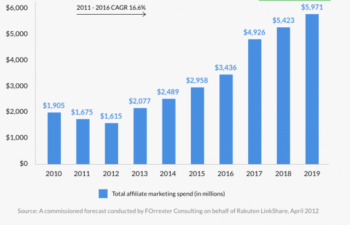Join Our Telegram channel to stay up to date on breaking news coverage
There are things in life that we are subject to, without even knowing it. Affiliate marketing is one example. It can be said with near certainty that everyone has been influenced by affiliate marketing. Not convinced? When was the last time you purchased something based on the recommendation of someone else? That is the basic premise behind affiliate marketing.
Affiliate marketing is a type of rewards based marketing. A publisher promotes a product with a specialized link that can track if a sale was made. If so, the publisher gets a profit of that sale.
There are a number of reason why this is a successful form of marketing. The main one being that there is almost no risk involved for the merchant. Because it is a rewards-based marketing scheme, merchants only pay if a sale is made. Presumably, this is a sale that would not have been made apart from the recommendation of the publisher. The merchant wins because they have generated a sale they otherwise would not have been able to. And the publisher wins because they are earning a profit for something they might recommend without being paid for it.
The Dark Side of Affiliate Marketing: The Third Party
There are also some problems with affiliate marketing, and like many problems in life, it stems from a lack of trust. At times this lack of trust is from the merchant, towards the publisher. Some publishers have figured out how to trick the system into crediting sales which they did not generate to their affiliate marketing accounts. This issue was made popular when Ebay used the help of the FBI to track down the top perpetrators.
More commonly, publishers are the ones not trusting the merchants. This lack of trust can often be traced to a single source, the third party. As in every industry, there is a third party taking a cut of the money that is transfering hands. This is where the lack of trust takes place.
Third party companies, also known as the affiliate network, broker deals, links, and payments between the merchants and the publishers. They take a ten to 25 percent cut of a sale that is made. As the data gatherers, the affiliate network tells the publisher how many sales were made. Also the payments from the merchant pass through the hands of the affiliate network before reaching the publisher.
It’s easy to see how this can get shady. Data can be manipulated or forged. Publishers don’t always know exactly how many sales are generated. In fact they often aren’t even talking with the merchant.
A Blockchain Solution in Attrace
So how are merchants and publishers solving these problems? Many have been turning to the newest technology craze, blockchain. One in particular is Attrace (ATTR).
Attrace is blockchain platform built entirely from scratch specifically for affiliate marketing. This platforms connects publishers directly with merchants, cutting out the need for a middleman. There are two main aspects to Attrace that make it so compelling.
The first aspect is the low fees. Most affiliate network companies charge up to 25 percent for their services. With Attrace, they only charge .5 percent, an incredible savings compared to using a third party.
The second aspect of Attrace is that they attach a smart contract to each click generated from a campaign. Other affiliate marketing blockchains only attach smart contracts to sales. Because Attrace tracks each click, even if a sale isn’t made, publishers and merchants alike know exactly what is happening with each campaign. Also, the smart contracts mean that the data is impossible to forge, reinstalling trust between the two parties.
Payments are made and fees are given to the publisher as soon as a sale is made. This is in contrast to the weeks and months it can take third parties to dole out the owed payments.
The Blockchain Affiliate Marketing Space
Attrace isn’t the only blockchain solution for affiliate marketing. RefToken (REF) was the first affiliate marketing blockchain.
Serving a similar purpose, RefToken helps provide links for the publishers to place on their sites. Once a sale is made, payment is instantly made in the form of their token, REF. Merchants purchase tokens in advance, helping them decide the budget they’d like to spend on their affiliate marketing campaign. Merchants also have the ability to accept or deny publishers for an affiliate marketing deal.
HOQU is another example of a blockchain for affiliate marketing. They also charge .5 percent and specialize in restoring the relationship between merchants and publishers. With HOQU, it’s not only the publishers that save money, but the merchants do as well. No longer are they subjected to the three to five percent bank charges or the five to 15 percent charge from an advertising service.
As consumer spending continues to grow in the online sphere, affiliate marketing will have a strong place. It’s time for the system to catch up with the times and bring trust back into the equation. Blockchain can help solve this issue.
Disclaimer: BTCManager does not endorse any content or product on this page. While we aim at providing you all important information that we could obtain, readers should do their own research before taking any actions related to the company and carry full responsibility for their decisions, nor this article can be considered as investment advice.
The post Blockchain Pushes Major Change in the Affiliate Marketing Space appeared first on BTCMANAGER.
Join Our Telegram channel to stay up to date on breaking news coverage

